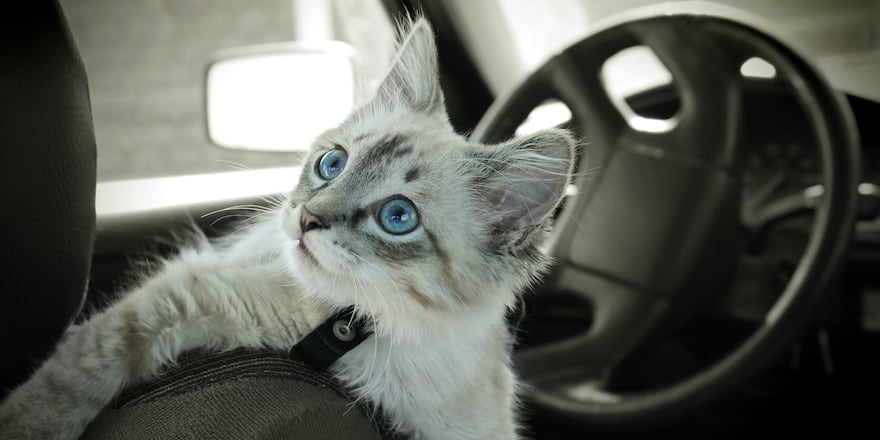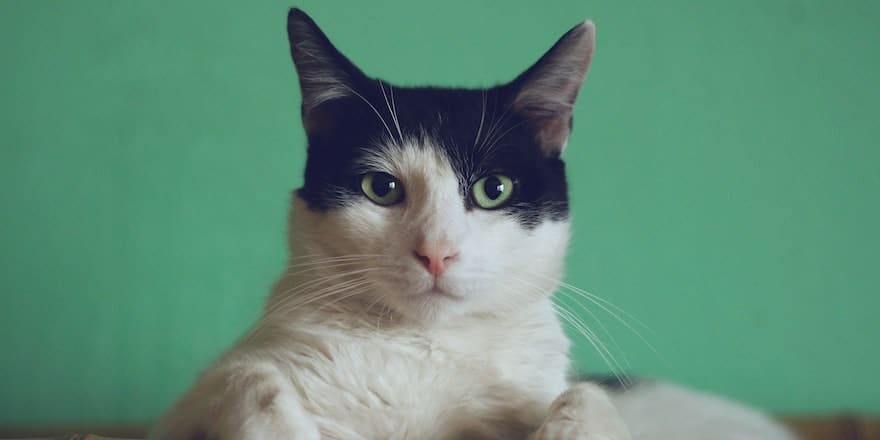Vomiting is the expulsion of the stomach’s contents through the mouth. In cats, it is particularly common and often pronounced. It can be accompanied by abdominal contractions that are sometimes dramatic!
A cat can vomit for many reasons, from the simple regurgitation of hairballs to much more serious causes such as an intestinal obstruction, chronic kidney disease, or even lymphoma.
Determining the cause of a cat’s vomiting involves a veterinary consultation, often with additional tests such as blood tests, X-rays, or an abdominal ultrasound.
Read also | What are the best wet foods for cats?
What should I do if my cat vomits occasionally?
Episodic vomiting is common in cats. Most of the time, they are not serious.
That does not mean they shouldn’t be treated, because over time they can cause inflammation of the digestive tract.
My cat vomits undigested kibble
Regurgitation of undigested food is a classic form of feline vomiting; it’s not uncommon for the charming kitty to even eat its vomit right away!
These vomitings are generally caused by greedy animals that eat their meal too quickly.
To avoid this inconvenience, you can split the daily amount of kibble into several small meals.
Ideally, you should even place them in several bowls in different locations around the apartment or house. This helps reproduce the cat’s natural nibbling/hunting behavior.
Additionally, there are special slow-feeder bowls sold commercially that help slow down food intake. They have a playful aspect that appeals to small felines.
My cat vomits hair
Another classic! The cat is a clean animal that grooms itself a lot. By licking, it ingests many hairs that irritate the stomach and can sometimes form compact masses.
Vomiting from hairballs is more common in long-haired cats.
This symptom should not be taken lightly because it causes chronic inflammation of the digestive tract.
In the most severe cases, hairballs can cause an intestinal obstruction requiring surgery.
To resolve the problem, you will need to:
- Brush the cat very regularly to remove as many loose hairs as possible.
- Regularly give it lubricants to help eliminate hair in the stool (available from veterinarians).
- Éventuellement, lui proposer des croquettes spéciales dites de prévention des boules de poils (Hairball).
My cat vomits cat grass
Cats love catnip or cat grass, but the feeling isn’t necessarily mutual!
Ingesting these plants can indeed cause stomach irritation and vomiting. If you find these plants in your cat’s vomit, it’s best to stop playing gardener.
My cat vomits white or yellow foam
White or yellow vomit occurs when animals vomit on an empty stomach, or have nothing left to vomit.
This is gastric or duodenal juice, possibly mixed with gas which gives it a frothy appearance.
My cat vomits water
A cat that vomits may regurgitate the slightest drop of water swallowed. It is important to withhold food.
My cat vomits blood
Traces of blood in a cat’s vomit may simply be a sign of stomach irritation.
In the case of a large pool of blood, more serious causes such as poisoning by anticoagulants or a tumor may be involved. A veterinary consultation is necessary.
Mon chat vomit des vers
Some worms such as roundworms may be present in vomit. They are common in kittens and look like white spaghetti.
If your cat vomits worms, you will need to give it a dewormer, then repeat the treatment 15 days later.
Quick reminder: kittens should be dewormed once a month until they are 6 months old.
My cat vomits in the car
Many felines are not big fans of car travel. It is sometimes difficult in this species to distinguish between stress and motion sickness.
Stress manifests as symptoms like piercing yowls and diarrhea. Motion sickness can too… often with nausea and vomiting as well.
In case of vomiting, you can ask your veterinarian for a tablet to give half an hour before departure.
Also read | Our buying guide to the best cat kibble

What should I do if my cat vomits several times in one day?
My cat vomits and has diarrhea
Acute vomiting and diarrhea can be a sign of gastroenteritis of foodborne, bacterial, or viral origin.
You can put your kitty on a 24-hour fast, but if the symptoms persist or if your cat is very young, elderly or fragile, or appears unusually lethargic, you should consult a veterinarian immediately.
The treatment includes antispasmodics, digestive protectants and sometimes antibiotics.
In cases of severe gastroenteritis, hospitalization may be necessary, especially for kittens because of the risk of dehydration.
The typhus (or feline panleukopenia) is an extremely serious viral gastroenteritis in cats. It can be prevented by vaccination starting at 2 months of age.
Sudden vomiting can also signal a liver disorder (cholangiohepatitis, fatty liver), which is common in cats. A blood test will generally detect it.
My cat swallowed a foreign object
This problem is more common in young cats. Many objects can be swallowed by cats deliberately or accidentally (for example while playing): small toys, strings, foam earplugs…
If the object becomes lodged in the intestine, it can cause an obstruction that presents with severe vomiting, loss of appetite, lethargy and sometimes abdominal pain.
The diagnosis is made by the veterinarian based on the clinical examination, an X-ray or an ultrasound.
The treatment is surgical and must be performed without delay.

What should I do if my cat vomits frequently?
Vomiting that occurs regularly over several weeks may be a sign of a chronic condition. It may be due to various complications.
A chronic kidney disease in cats
It occurs in middle-aged to older animals. It is often related to kidney disease, but sometimes also to stones.
The classic symptoms include vomiting, weight loss, decreased appetite and polyuria-polydipsia (increased drinking and urination).
The diagnosis is made based on a blood and urine workup and/or a renal ultrasound.
A lymphoma of the digestive tract in cats
Lymphoma is a cancerous tumor that develops in the wall of the digestive tract. It can affect the stomach, intestines and lymph nodes, and may appear diffuse or localized as a mass.
Aside from vomiting, affected animals often show decreased appetite, weight loss and diarrhea.
Oral chemotherapy often gives good results in the management of this feline cancer.
A chronic inflammatory disease in cats (IBD)
IBD has similarities with lymphoma, from which it is not always easy to distinguish. But IBD is an inflammatory, noncancerous condition.
Treatment involves corticosteroids.
In cases of chronic vomiting, it is important to consult a veterinarian who alone can make the diagnosis and recommend the best treatment for your pet.
Should you adjust the diet of a cat that vomits?
Some diseases may require a change of diet.
For example, a cat that often regurgitates hairballs may be offered special kibbles (Hairball care or Hairball control): higher in fiber, they help the natural elimination of hair in the feces.
A cat suffering from renal failure should receive a specially formulated diet with high-quality proteins to reduce the formation of toxic waste.
These special kibbles or pâtés help prolong the lives of affected cats and alleviate the symptoms of the disease.
For IBD, highly digestible and/or hypoallergenic kibble is recommended.
A cat that vomits occasionally is not necessarily ill. However, if it happens again, or if its health appears to be deteriorating, don’t hesitate to consult your veterinarian.



